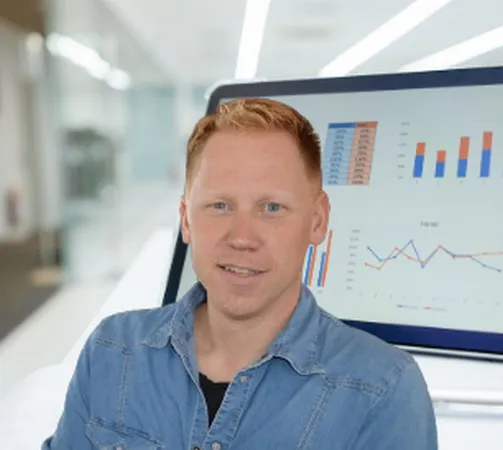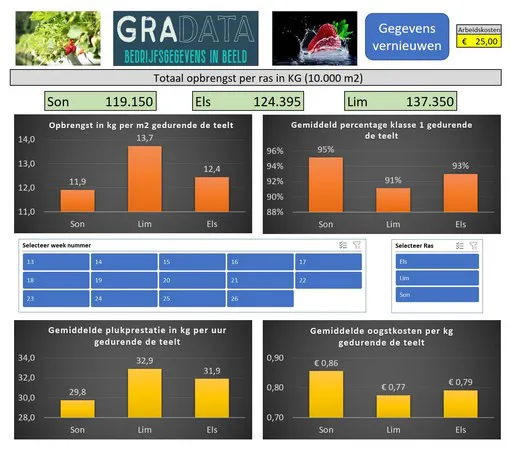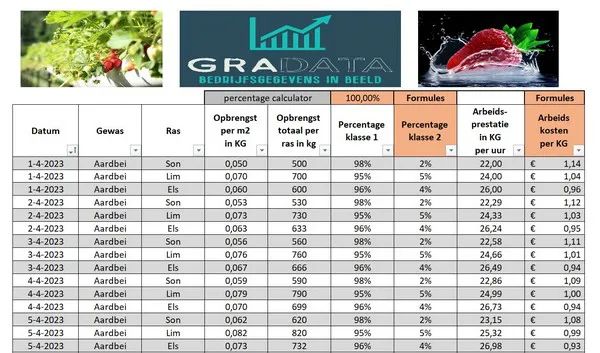Geert Jans is a data specialist. Not one who only works from behind his desk, but one who has a lot of experience in horticulture, as well as in greenhouses. He now uses that experience as the owner of his own company Gradata. He launched it on the market in week 19 and is already working on his first jobs.
Geert has carried out data projects for several horticultural companies in the past. "I took up plant assessment projects and helped growers process, analyze, and present data." He did this in Excel dashboards and will also do so from Gradata. "I don't write software myself, but I do create something. Even with all the accounting and software programs already out there, there is always a need for a piece of customization."
With Gradata, the data specialist can work anywhere. "I already carry out projects for self-employed people. They don't work in horticulture." He is also already in contact with an international party, who is from the horticulture sector. Geert's roots are also in that sector. He took a horticultural training course. "Growing plants gives me an awful lot of energy. I also speak the language of horticulturists."

Draft paper
After his last salaried horticultural job, he noticed from basic conversations that there is a great need in horticulture for structure and more insight into cultivation. "Then I thought, that's what I'm good at, that's what I like to do, and that's what I have a knack for," he says.
He never ceases to be amazed at what is sometimes still being worked out on scrap paper. This is especially common with entrepreneurs who have to do without the help of all kinds of 'in-house' specialist teams. "Moreover, you see that as long as things are still going well financially, people don't zoom in so much on the details."
At a glance
Until it does become necessary, for example, with the outbreak of the energy crisis, then it turns out that extracting details from data is not so easy. It is then up to Geert to use Gradata to collect and present information in such a way that it is clear at a glance. "By presenting information in such a way that it is easy to understand, people can also make more informed choices together."
By the way, it is certainly not only the 'smaller' companies or sole traders that are struggling with data. Larger companies are also increasingly needing to get a better handle on things, he notes. "When it comes optimizing large numbers and large areas, it can accelerate the process considerably."
Can he give an example of that? "If you know at what amount of light and at what temperature you can create a certain speed for your plant, and therefore shorten the cultivation time, as well as the costs involved, then you can make the ideal return." For example, about whether or not to turn on grow lights? Geert nods. "You can make calculations for that." Calculating with varying prices is a challenge, though. "Especially if the grower counts on free trade for sales. Then you sometimes have to make assumptions."

Graphical representation of strawberry variety yield per kilogram per hectare
Don't lose sight of practice
The grower, who often has many things on his plate at once, is not keen on such complex calculations but must make the decisions. "An accounting program can do an awful lot but can't make light or temperature calculations and prescribe the best-growing strategy." The same goes for separate cost-price calculations. "That doesn't always work in existing accounting programs either."
He hastens to say that he cannot do everything himself either. "You try to answer as many questions as possible. Or provide an Excel format in which growers can enter data themselves and work with it."

Example of an input format with an overview of labor costs, yields, and other data recorded at a strawberry farm.
When Geert was still at school, data was not nearly as prevalent as it is now. "Cost calculations were used, but not nearly as intensively as now," he says. Also relatively new are Het Nieuwe Telen (The New Cultivation) and certainly the RTR, the radiation to temperature ratio, which growers are being introduced to. Geert also follows those developments and is familiar with them. "Then you could calculate at how much light and at what temperature you are going to see a weight increase in fruit."
Gradata can also help make data insightful here. "You should never lose sight of practice because, on paper, it can all be correct. You always have feelers, the people in the greenhouse, and you should never lose sight of them," the data specialist does stress.
Variety
Geert hopes he can find the balance between greenhouse and the office because he is also a practical man. "That's just part of it, too, and it's fun. You can see or read it from a screen, but the good cultivators walk in the greenhouse. If you don't make yourself comfortable in the greenhouse, the plants probably won't like it either."
However, he does see an increasing role for data. "You regularly hear about varieties that they 'don't do so well' because they 'don't like cold or wetness.' But what is warm for one grower, and what is wet for another? You have to measure that, know that, and link numbers to that so it's clear to everyone. I can help companies with that." By the way, still salaried as well, if companies want. "I am flexible and open for a no-obligation cup of coffee."
For more information:
Geert Jans 
Gradata
Kerkstraat 33
5863 AP, Blitterswijck
Tel.: +31 (0) 6 48 96 92 41
info@gradata.nl
www.gradata.nl
